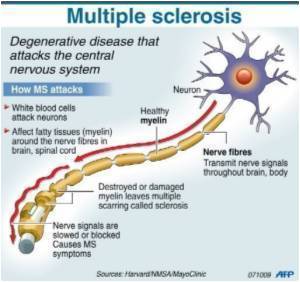British researchers are excited over the discovery of a new chemical compound that could inhibit pro-inflammatory signals in multiple sclerosis (MS).

Dr Bruno Gran, a Clinical Associate Professor in the Division of Clinical Neurology in the School of Clinical Sciences, collaborated with Professor Paul Moynagh from the National University of Ireland, Maynooth in the research.
Dr Gran said: “Under laboratory conditions we have found a way of encouraging the body to produce its own Interferon-beta. When other experimental substances have been tested in the laboratory to achieve this effect, they usually cause the immune system to produce a mixture of anti-inflammatory as well as pro-inflammatory molecules, typically reducing the overall efficacy. In the case of the compound tested in this study (a synthetic cannabinoid known as R(+)WIN55,212-2), the predominantly anti-inflammatory effects appear promising for further pre-clinical, and hopefully clinical, testing.
With no available cure MS is the focus of intense study for the hundreds of scientists across the world who are working on new treatments for this disabling disease. MS is more common in temperate climates. With around 100,000 people suffering from MS in the UK the country has one of the highest rates of the disease in the world.
Until 20 years ago there was little progress in the search for treatments.
After their first approval in 1993 Beta Interferons still represent one of the first line treatments for relapsing-remitting multiple sclerosis. These drugs are not a cure but they can reduce the number and severity of relapses. Despite this, more effective, well tolerated therapeutic strategies are needed.
Advertisement
The cause of MS is still something of a mystery. Numerous factors are thought to contribute, including genetic susceptibility and environmental factors. The latter are thought to include certain viral infections and low levels of vitamin D, linked to poor sun exposure.
Advertisement
Source-Medindia











